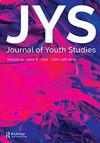封锁措施:葡萄牙第一次封锁期间家庭中年轻人的肖像
IF 2.2
3区 社会学
Q1 SOCIAL SCIENCES, INTERDISCIPLINARY
引用次数: 1
摘要
摘要各国政府推出了包括封锁和保持社交距离在内的保护性公共卫生措施,以应对新冠肺炎大流行带来的前所未有的全球危机。对于年轻人来说,这些措施尤其痛苦,因为它们会中断他们向成年的过渡,而成年通常需要在公共场所占据自己的位置,成为公认的社会同龄人,无论是离开父母家、建立亲密关系还是找一份全职工作。在葡萄牙,这种过渡往往被推迟,年轻人与父母同居的时间要长得多,封锁意味着退出公共空间,生活在一个密集的家庭集体中。这带来了许多挑战并造成了紧张局势。基于一项关于葡萄牙疫情影响的非代表性在线调查的结果,本文使用家庭主义的概念视角,重点关注16-24岁的年轻人如何适应2020年的封锁。研究结果表明,家庭主义仍然是逆境中的一个关键支持系统,通过日常的恢复力和(自我)照顾、更新和重塑社会纽带来证明代际团结。然而,个人保持距离的做法被部署在后台,减轻和削弱了家庭主义的压倒性控制。本文章由计算机程序翻译,如有差异,请以英文原文为准。
Lockdown practices: a portrait of young people in the family during the first lockdown in Portugal
ABSTRACT Governments introduced protective public health measures, including lockdowns and social distancing, in response to the unprecedented global crisis brought about by the COVID-19 pandemic. For young people, such measures are particularly painful, as they entail an interruption of their transitions to adulthood, which generally require taking up their position in the public space and emerging as a recognised social peer, either through leaving the parental home, initiating an intimate relationship or getting a full-time job. In Portugal, where such transitions are often postponed, and young people cohabit with parents for much longer, lockdown meant withdrawal from the public space and living in an intensive family collective. This brought many challenges and created tension. Based on the results of a non-representative online survey on the impacts of the pandemic in Portugal, this article focuses how young people aged 16–24 adapted to the 2020 lockdown, using the conceptual lens of familialism. The results show that familialism remains a key support system in adversity, evidencing intergenerational solidarity through everyday practices of resilience and (self-) care, renewing and remaking social bonds. Individual distancing practices are deployed backstage, however, mitigating and nuancing the overwhelming hold of familialism.
求助全文
通过发布文献求助,成功后即可免费获取论文全文。
去求助
来源期刊

Journal of Youth Studies
SOCIAL SCIENCES, INTERDISCIPLINARY-
CiteScore
5.00
自引率
10.50%
发文量
82
期刊介绍:
Journal of Youth Studies is an international scholarly journal devoted to a theoretical and empirical understanding of young people"s experiences and life contexts. Over the last decade, changing socio-economic circumstances have had important implications for young people: new opportunities have been created, but the risks of marginalisation and exclusion have also become significant. This is the background against which Journal of Youth Studies has been launched, with the aim of becoming the key multidisciplinary journal for academics with interests relating to youth and adolescence.
 求助内容:
求助内容: 应助结果提醒方式:
应助结果提醒方式:


